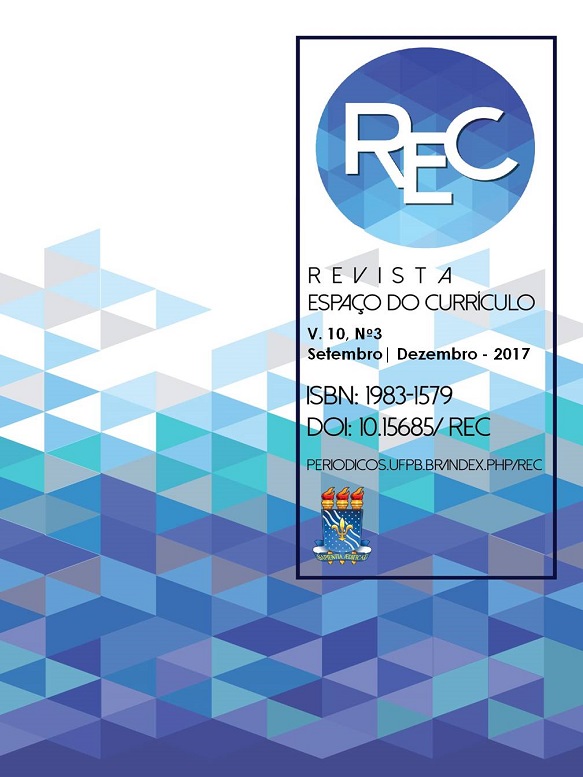SOBRE POLÍTICAS EM CURRÍCULO E RESISTÊNCIAS E INVENÇÕES E COTIDIANOS ESCOLARES E DESAFIOS E... “VAI TER LUTA!”
DOI:
https://doi.org/10.15687/rec.v10i3.37764Palavras-chave:
Educação., Currículo., Políticas Educacionais.Resumo
A convite dos editores da Revista Espaço do Currículo iniciamos, a partir de julho de 2016, um movimento que tem como principal objetivo dar visibilidade e, ao mesmo tempo, estimular trocas e potencializar estudos e pesquisas que questionam as visões tradicionais de currículo, reduzindo-o a listagens de conteúdos e metodologias ou de habilidades e competências que, a cada época, se atualizam e encontram terreno fértil em discursos empresariais, religiosos e, inclusive, acadêmicos, como temos presenciado com a atual proposta de uma Base Nacional Comum Curricular (BNCC). Hoje em dezembro de 2017, sob o impacto de sua aprovação por um Conselho Nacional de Educação (CNE) muito diferente daquele com o qual dialogávamos em 2015, continuamos defendendo que não podemos abrir mão de lutar contra os efeitos perversos que as políticas pós-golpe (SOUZA, 2016) vem provocando na área educacional, sobretudo nos cotidianos das escolas públicas. Assim, consideramos de fundamental importância retomar, nesta apresentação, algumas das principais razões pelas quais temos nos posicionamos contra a ideia de se ter uma base curricular comum para as escolas brasileiras, que tem como uma de suas marcas mais nefastas a unificação dos conteúdos, com base no suposto tratamento igual dos diferentes.
Downloads
Métricas
Referências
ALVES, Nilda. Redes educativas ‘dentrofora’ das escolas, exemplificadas pela formação de professores. In: DALBEN, Ângela; DINIZ, Júlio; LEAL, Leiva; SANTOS; Lucíola (Org.). Convergências e tensões no campo da formação e do trabalho docente. Belo Horizonte: Autêntica, 2010. p. 49-66.
ALVES et al. (Org.). Criar currículo no cotidiano. São Paulo: Cortez, 2002.
CERTEAU, Michel de. A invenção do cotidiano 1: as artes de fazer. Petrópolis: Vozes, 1994.
PINAR, W. F.“A equivocada educação do público nos Estados Unidos”, In: GARCIA, R. L. e MOREIRA, A. F. B. (orgs). Currículo na Contemporaneidade: incertezas e desafios. São Paulo: Cortez, 2008.
PINAR, W. F. What is curriculum theory? [O que é teoria do currículo?] New Jersey: Lawrence Erlbaum, 2012.
PRICE, T. A.. Comum para quem?. Revista E-curriculum, PucSP, v. 12, n. 3 p. 1614-1633, dez. 2014.
SOUZA, J. A radiografia do golpe: entenda como e porque você foi enganado. Rio de Janeiro: Le Ya, 2016.
SÜSSEKIND, M. L.. O ineditismo dos estudos nosdoscom os cotidianos: currículos e formação de professores, relatos e conversas em uma escola pública no Rio de Janeiro, Brasil. E-curriculum, São Paulo, v. 8, n. 2, p.2-21, ago. 2012.
SÜSSEKIND, M. L. As (im)possibilidades de uma Base Comum Nacional. Revista e-Curriculum (PUCSP), v. 13, p. 1-0000, 2014.
VEIGA-NETO, Alfredo. A didática e as experiências de sala de aula: uma visão pós estruturalista. Educação & Realidade. Porto Alegre: Faculdade de Educação/UFRGS, v.21, n.2, p.161-175, Jul/Dez, 1996.
Downloads
Publicado
Como Citar
Edição
Seção
Licença
Ao submeter um artigo à Revista Espaço do Currículo (REC) e tê-lo aprovado, os autores concordam em ceder, sem remuneração, os seguintes direitos à Revista Espaço do Currículo: os direitos de primeira publicação e a permissão para que a REC redistribua esse artigo e seus metadados aos serviços de indexação e referência que seus editores julguem apropriados.















